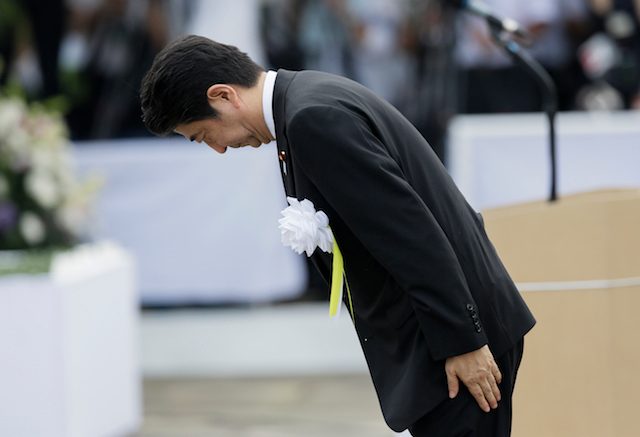SUMMARY
This is AI generated summarization, which may have errors. For context, always refer to the full article.

TOKYO, Japan – Japan should stop apologizing for its war record, according to a majority of voters surveyed in a poll published Wednesday, August 18.
But they were more divided about a World War II anniversary speech by Prime Minister Shinzo Abe that drew criticism from China and South Korea.
On the eve of the 70th anniversary of the war’s end, Japan’s nationalist premier expressed deep remorse over the war and said previous apologies would stand.
However, future generations should not be “pre-destined” to say sorry for Tokyo’s wartime record, he added on Friday, August 14.
The poll published by Yomiuri newspaper found 63% of those surveyed agreed that Japan should refrain from saying sorry in future, while 27% said it should continue.
More than 2/3 supported Abe’s vow to uphold previous national apologies, however.
Japan’s neighbors hit out at the closely watched statement by Abe, the grandson of a wartime cabinet minister, saying he failed properly to atone for Tokyo’s past aggression.
Voters were divided over the speech, according to the weekend poll of 1,761 households, which found 48% had a favorable view of Abe’s remarks against 34% who did not.
Allies including the United States and Britain applauded Abe’s comments, and his plunging popularity appeared to get a boost, rising two percentage points to 45 percent.
However Abe’s speech was criticized for only indirectly echoing his predecessors’ contrition over Japan’s imperial march across Asia in the 20th century.
And in a possible jab at the conservative leader, emperor Akihito on Saturday said that he felt “profound remorse” over World War II – a conflict fought in the name of his father Hirohito.
‘Uncomfortable position’
Japan’s wartime history has come under the spotlight since Abe swept to power in late 2012, and there was much speculation on whether he would follow a landmark 1995 statement by then-premier Tomiichi Murayama.
That statement, which became a benchmark for subsequent apologies, expressed “deep remorse” and a “heartfelt apology” for the “tremendous damage” inflicted.
Hawkish Abe has also faced domestic opposition over security bills that would allow Japanese troops to engage in combat – to defend an ally which comes under attack – for the first time since the war.
“Mr. Abe said the right thing to a domestic audience,” said Stephen Nagy, associate professor at Tokyo’s International Christian University.
“It is not surprising that second- and third-generation (Japanese) don’t feel obliged to apologize,” he added, pointing to the country’s post-war pacifism and multi-billion-dollar foreign aid programs.
Analysts have said Abe’s remarks were unlikely to significantly damage – or improve – relations with neighbors.
His speech made direct reference to the suffering of Chinese people at the hands of Japanese soldiers, and indirectly referenced so-called comfort women whom historians say were forced to work in Japanese military brothels.
Nagy added that “relations with South Korea could have improved dramatically” had Abe made a clearer statement on the victims of military brothels.
Japan colonized parts of China in the thirties and the Korean peninsula from 1910 to 1945.
“Since Western and Southeast Asian countries viewed the speech favorably, Beijing and Seoul could find themselves in an uncomfortable position if they keep taking a tough stance against Japan over history,” said Mikitaka Masuyama, dean of the National Graduate Institute for Policy Studies. – Kyoko Hasegawa, AFP / Rappler.com
Add a comment
How does this make you feel?
There are no comments yet. Add your comment to start the conversation.